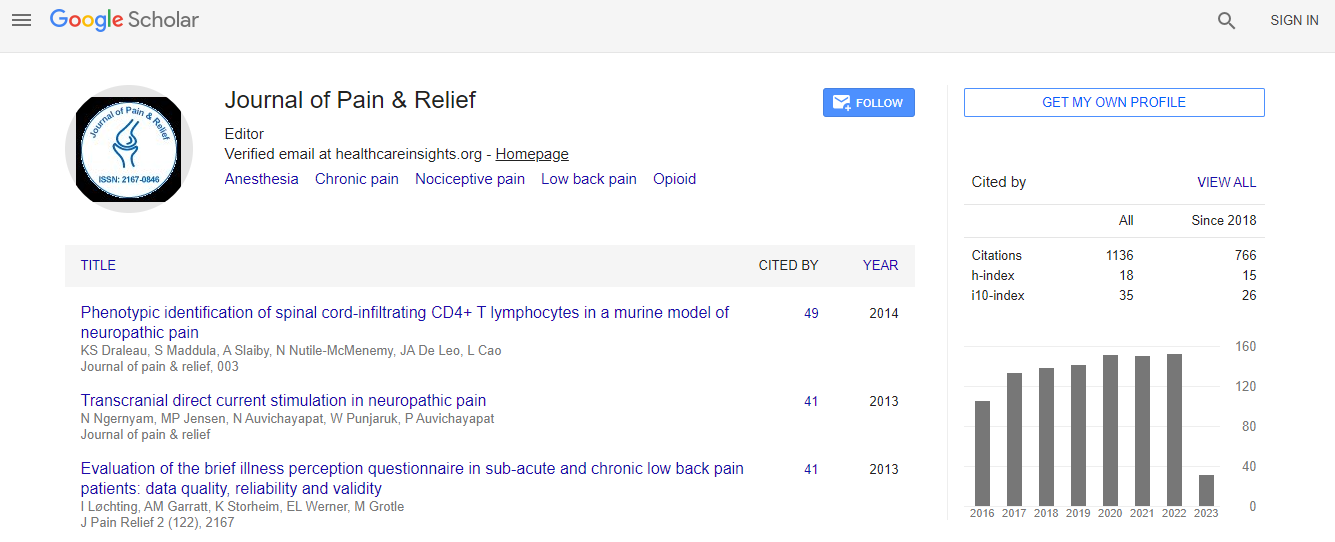Our Group organises 3000+ Global Conferenceseries Events every year across USA, Europe & Asia with support from 1000 more scientific Societies and Publishes 700+ Open Access Journals which contains over 50000 eminent personalities, reputed scientists as editorial board members.
Open Access Journals gaining more Readers and Citations
700 Journals and 15,000,000 Readers Each Journal is getting 25,000+ Readers
Recommended Conferences
42nd Global Conference on Nursing Care & Patient Safety
Toronto, CanadaGoogle Scholar citation report
Citations : 1583
Journal of Pain & Relief received 1583 citations as per Google Scholar report
Journal of Pain & Relief peer review process verified at publons
Indexed In
- Index Copernicus
- Google Scholar
- Open J Gate
- Genamics JournalSeek
- Cosmos IF
- RefSeek
- Hamdard University
- EBSCO A-Z
- OCLC- WorldCat
- Publons
- Geneva Foundation for Medical Education and Research
- Euro Pub
- ICMJE
Useful Links
Recommended Journals
Related Subjects
Share This Page
How to deal with patients addicted to pain-relieving opioids
7th International Conference and Exhibition on Pain Research and Management
Fred Nyberg
Uppsala University, Sweden
ScientificTracks Abstracts: J Pain Relief
Abstract
Over the past decade, the prescribing of opioids has increased dramatically in Western countries and in particular in North America. In parallel with this increase in opioid addiction, overdose, and associated deaths have been seen. A similar situation occurs in Sweden, where an about 40% increase in drug-related deaths has been documented, over the past decade, mainly due to opioids. These include synthetic drugs as methadone, buprenorphine and fentanyl and an increase has been seen in both males and females. A certain part of the increase is seen in opioid deaths combined with benzodiazepines. Although opioid addiction is effectively treated via a multidisciplinary approach including agonist opioid treatment and psychosocial intervention there are some difficulties. Misuse and diversion of pain medicines, like methadone and buprenorphine comprise a significant problem in Sweden as well as in other Nordic countries as these problems are linked to poor treatment compliance and increases in risk of blood-borne infections, crime, and mortality. To address this problem, changes in medicines used in some Nordic have already been implemented and considerations are under way in others. The new guidelines for treatment of opioid addicts in Sweden recommend combination of buprenorphine-naloxone before mono-buprenorphine. However, even if the occurrence of misuse and diversion of opioid medicine can be reduced there are other issues not always considered. Many opioid addicts in Sweden are infected by Hepatitis C Virus (HCV) and many of these have not been diagnosed and although we have effective medicines against HCV a great part are in lack of treatment. Another issue is that long-term opioid treatment may result in effects on the brain leading to cognitive decline. This presentation will deal with all these problems and in particular it will focus on the possibility to reverse opioid-induced damages on brain areas associated with cognitive function. Recent Publications: 1. Bazov I, Kononenko O, Watanabe H, Kuntić V, Sarkisyan D, Taqi MM, Hussain MZ, Nyberg F, Yakovleva T and Bakalkin G (2013) The endogenous opioid system in human alcoholics: molecular adaptations in brain areas involved in cognitive control of addiction. Addiction Biology 18:161-9. 2. Rhodin A, Grönbladh A, Ginya H, Nilsson K W, Rosenblad A, Zhou Q, Enlund M, Hallberg M, Gordh T and Nyberg F (2013) Combined analysis of circulating β-endorphin with gene polymorphisms in OPRM1, CACNAD2 and ABCB1 reveals correlation with pain, opioid sensitivity and opioid-related side effects. Molecular Brain doi: 10.1186/1756- 6606-6-8. 3. Rhodin A, von Ehren M, Skottheim B, Grönbladh A, Ortiz-Nieto F, Raininko R, Gordh T and Nyberg F (2014) Recombinant human growth hormone improves cognitive capacity in a pain patient exposed to chronic opioids. Acta Anaesthesiologica Scandinavica 58(6):759-65. 4. Nylander E, Grönbladh A, Zelleroth S, Diwakarla S, Nyberg F and Hallberg M (2016) Growth hormone is protective against acute methadone-induced toxicity by modulating the NMDA receptor complex. Neuroscience 339:538-547. 5. Kakko J, Gedeon C, Sandell M, Grelz H, Birkemose I, Clausen T, Rúnarsdóttir V, Simojoki K, Littlewood R, Alho H and Nyberg F (2018) Principles for managing OUD related to chronic pain in the Nordic countries based on a structured assessment of current practice. Substance Abuse Treatment, Prevention, and Policy DOI: 10.1186/s13011-018-0160-7.Biography
Fred Nyberg is Professor in Biological Research on Drug Addiction at the Department of Pharmaceutical Biosciences, Uppsala University. Since 2011 he has been Head and Coordinator of Uppsala University Center for Interdisciplinary Research on Drug Addiction (U-FOLD). During 2002-2007, he was employed part time by the Swedish Government as Head of Research Issues at The National Drug Policy Coordinator and in 2008 he joined the Advisory Board at The ANDT unit at The Social Ministry dealing with questions relating to drugs and drug addiction. He was Chairman for the Department of Pharmaceutical Biosciences during 1999-2006, and in 2006 he was appointed as Dean at The Faculty of Pharmacy, Uppsala University. He has contributed profoundly to the research community, with over 400 articles in his list of publications reflecting broad aspects of problems related to addiction
E-mail: fred.nyberg@farmbio.uu.se

 Spanish
Spanish  Chinese
Chinese  Russian
Russian  German
German  French
French  Japanese
Japanese  Portuguese
Portuguese  Hindi
Hindi 
